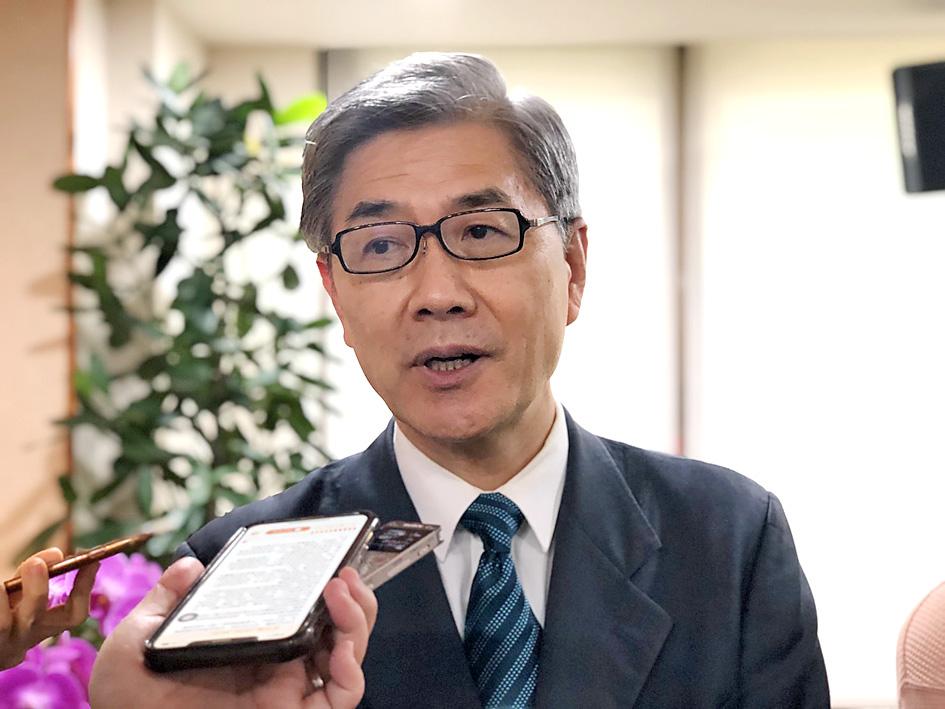The Financial Supervisory Commission (FSC) would set up new guidance by the end of August to boost corporate governance, insurers’ solvency, green financing, financial technology, the trust industry and information security, new FSC Chairman Thomas Huang (黃天牧) said yesterday.
“Corporate governance has been improved in terms of compliance and shareholding disclosure with former chairman Wellington Koo (顧立雄) at the helm. It is time to move to the next phase to focus on companies’ roles in sustainable development,” Huang told a news conference in New Taipei City.
The commission would also set policies to incentivize companies to increase green financing and adopt the Equator Principle, a set of voluntary guidelines for companies to assess environmental risks in financing, he said.

Photo: Kelson Wang, Taipei Times
The commission would review its regulatory sandbox program and might consider making some changes in the rules to enable more start-ups or technology firms to use the sandbox, Huang said, adding that he would hold a meeting with representatives of the technology industry next month.
While Koo aimed to conduct 10 experiments in the sandbox per year, Huang would later announce the key performance indicators he uses to evaluate if the program works, he said.
As insurance regulators worldwide last year agreed to finalize a global supervisory framework at the annual International Association of Insurance Supervisors conference, the commission would keep pace by introducing the Insurance Capital Standard (ICS) version 2.0 in Taiwan, Huang said.
The commission would ask all insurers to re-evaluate their assets and liabilities based on the ICS version 2.0 from this year to 2024, after which the commission would determine whether to implement the global standards with moderate modifications, he said.
“Foreign companies would continue investing in Taiwan, while some local insurers would also expand their operations to Southeast Asia. It would be beneficial for them to adopt the international standards,” he said.
With the coronavirus outbreak easing in Taiwan, financial companies could themselves decide whether to keep their contingency measures to prevent infections, such as having staff work in separate locations or asking some to work from home, Huang said.
“We have three focuses for companies amid the pandemic: whether their employees are safe and healthy, whether their operations remain normal and whether the companies’ practices are helpful to market stability,” he said.
Huang said he expects some companies to continue holding videoconferences or having some employees telework even though the spread of the virus slows down, as such practices are deemed convenient and cost-saving, he added.

MULTIFACETED: A task force has analyzed possible scenarios and created responses to assist domestic industries in dealing with US tariffs, the economics minister said The Executive Yuan is tomorrow to announce countermeasures to US President Donald Trump’s planned reciprocal tariffs, although the details of the plan would not be made public until Monday next week, Minister of Economic Affairs J.W. Kuo (郭智輝) said yesterday. The Cabinet established an economic and trade task force in November last year to deal with US trade and tariff related issues, Kuo told reporters outside the legislature in Taipei. The task force has been analyzing and evaluating all kinds of scenarios to identify suitable responses and determine how best to assist domestic industries in managing the effects of Trump’s tariffs, he

TIGHT-LIPPED: UMC said it had no merger plans at the moment, after Nikkei Asia reported that the firm and GlobalFoundries were considering restarting merger talks United Microelectronics Corp (UMC, 聯電), the world’s No. 4 contract chipmaker, yesterday launched a new US$5 billion 12-inch chip factory in Singapore as part of its latest effort to diversify its manufacturing footprint amid growing geopolitical risks. The new factory, adjacent to UMC’s existing Singapore fab in the Pasir Res Wafer Fab Park, is scheduled to enter volume production next year, utilizing mature 22-nanometer and 28-nanometer process technologies, UMC said in a statement. The company plans to invest US$5 billion during the first phase of the new fab, which would have an installed capacity of 30,000 12-inch wafers per month, it said. The

Taiwan’s official purchasing managers’ index (PMI) last month rose 0.2 percentage points to 54.2, in a second consecutive month of expansion, thanks to front-loading demand intended to avoid potential US tariff hikes, the Chung-Hua Institution for Economic Research (CIER, 中華經濟研究院) said yesterday. While short-term demand appeared robust, uncertainties rose due to US President Donald Trump’s unpredictable trade policy, CIER president Lien Hsien-ming (連賢明) told a news conference in Taipei. Taiwan’s economy this year would be characterized by high-level fluctuations and the volatility would be wilder than most expect, Lien said Demand for electronics, particularly semiconductors, continues to benefit from US technology giants’ effort

‘SWASTICAR’: Tesla CEO Elon Musk’s close association with Donald Trump has prompted opponents to brand him a ‘Nazi’ and resulted in a dramatic drop in sales Demonstrators descended on Tesla Inc dealerships across the US, and in Europe and Canada on Saturday to protest company chief Elon Musk, who has amassed extraordinary power as a top adviser to US President Donald Trump. Waving signs with messages such as “Musk is stealing our money” and “Reclaim our country,” the protests largely took place peacefully following fiery episodes of vandalism on Tesla vehicles, dealerships and other facilities in recent weeks that US officials have denounced as terrorism. Hundreds rallied on Saturday outside the Tesla dealership in Manhattan. Some blasted Musk, the world’s richest man, while others demanded the shuttering of his